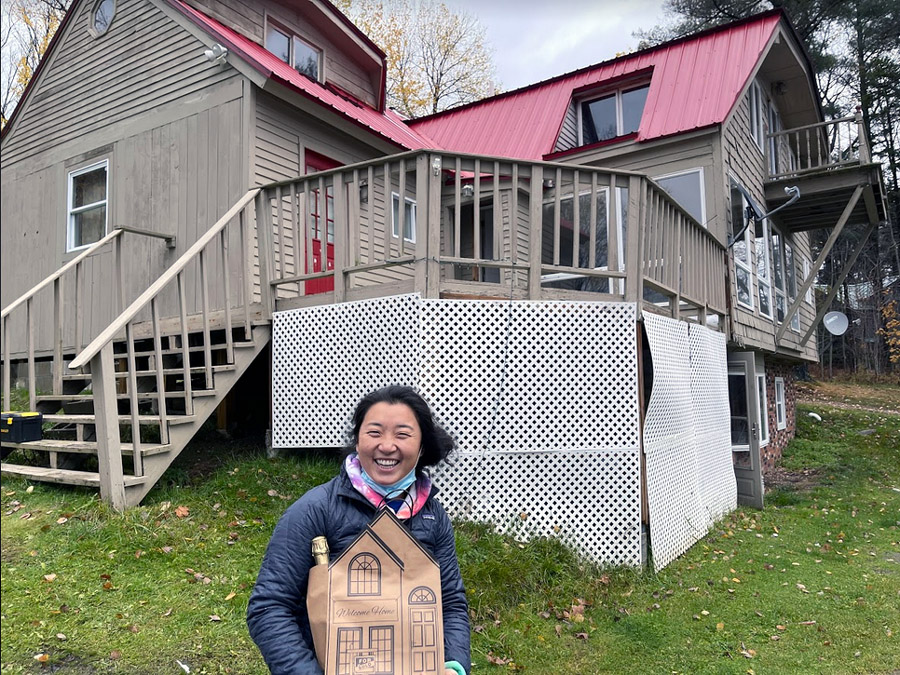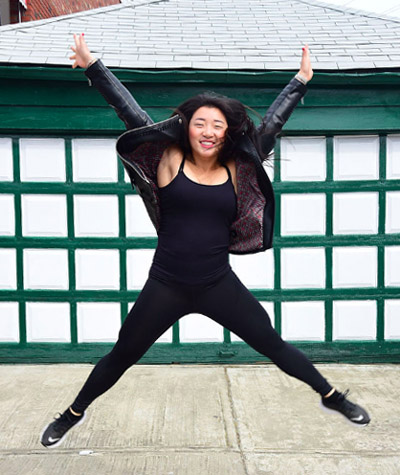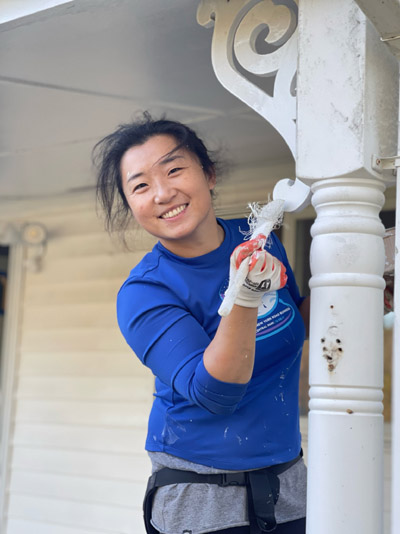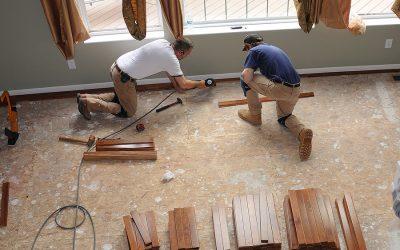
Before turning 30, Dandan Zhu reached financial independence and quit her day job. She still does some recruiting work and real estate investing on her own terms — but why stop when you love what you do?
Zhu scaled her real estate portfolio quickly through aggressive savings and pursuing a high salary. But as much as a six-digit salary helps, you don’t need a massive income to start building passive income streams with real estate.
Here’s how Dandan did it, and how she quit her day job just two years after starting to invest in real estate.
Dandan’s First Investment Property
“My first investment property was back in 2014 in Brooklyn. It was a condo in the roughest part of town, where there are plenty of gun deaths and gang activity. I knew that the NYC real estate scene was going to have significant appreciation but due to how expensive the whole city is, I could only afford to buy in a transitioning area.
“I had studied the market for quite some time until finally one day I saw an open house for a two-bedroom, one-bathroom condo at the affordable price of $340k. The day I saw it, I made an offer and looped my agent in to get the process going. Since I already had 20% to put down on it and a pre-approval, the next step was to wait until they finished the unit, since it was going to be a complete gut renovation.
“Most buyers are first-time homebuyers, so they needed a place immediately to move into. Given that this home would take another year to fully be renovated, this was a risky property that most investors and owners didn’t want to play with. This is the only reason why I was able to snatch it at such a great deal.
“A year later, we went through the mortgage process with a 20% down payment on a 30-year fixed rate loan. Since I had a high paying job, I could easily qualify for the loan and already had six figures of savings that I hoarded by living very cheaply and house hacking. Can’t remember the exact numbers but I had to bring $90k or so to the closing to account for all the buyer closing costs and taxes.
 Selling & Expanding
Selling & Expanding
“The condo appreciated to $615,000 by 2016, when I decided to sell it. I felt that the market was peaking and the marginal gain of holding versus selling wouldn’t be worth it.
“I ‘retired’ from my 9-to-5 in early 2016 in order to fully pursue becoming a landlord. I ended up using the proceeds from my Brooklyn condo to 1031 exchange the proceeds into a new condo in Massachusetts ($189,000 cash using the proceeds from the sale). I also bought two rental properties in Baltimore: a duplex ($245,000 with 20% down on a 30-year fixed loan), and a single-family rental ($135,000 with 20% down, with a co-signor since I’d quit my w2 income at this point).”
Professional Tenants & Growing Pains
“From the period of 2016-2018, I barely kept my living expenses afloat because my Baltimore properties had some really bad tenants and I lost quite a bit of money due to nonpayment of rent, continued eviction filings and property management fees to carry out the evictions, and also to fix the tenant damages.”
I know how that goes. I had terrible tenants in Baltimore as well. Nowadays, I no longer invest in low-end urban neighborhoods or tenant-friendly cities.
“I was using new tenant money and deposits to wash away old debts while accumulating and carrying a $17,000 credit card balance, the highest I’ve ever had. Thankfully, I pushed through, didn’t sell, and started earning money again through a new recruiting business which saved me. In 2018, one of my tenants clogged up the toilet and destroyed my bottom unit in the four-unit in Vermont. I was able to pay the $60,000 bill to reconstruct the bottom unit in cash because of my income from my recruiting business allowed me to take this instead of trying to leverage or take out a HELOC.
“Thankfully I had a really low cost of living due to my house hacking so I was able to live in Brooklyn comfortably while continuing to build my real estate experience and portfolio. I also invested in crypto around this time which helped me pay for some of the losses the tenants incurred.”
Continuing to Build Her Rental Portfolio
“I continued building my real estate portfolio and purchased a four-unit property in Vermont for the insanely cheap price of $145,000. I used the last savings I had from my corporate job to finance this deal and took $10,000 from my cousin who was a cosigner on the loan.
“I bought this property with tenants underpaying rent at $650 a month, which I moved up to $900 over time. The other three units I eventually converted to short-term rental properties, now earning over $15,000 per month in the winter season and about $6,000 in the offseason.
“From 2018-2022, I sold my Massachusetts and New Jersey condos and bought several other properties. I bought one in DC (cash purchase), bought and quickly sold a property in Denver (cash purchase), bought a duplex in Vermont (cash purchase), and then just bought another fourplex Airbnb property (cash purchase) that’s waiting to be renovated this year in order to get on the market. I also bought a lake house in upstate NY (cash purchase), that I looped my domestic partner in as well.”
The HOA Disaster
“My Massachusetts condo gave me extreme stress and headaches due to a horrific homeowners association leader who had her children on the board and totally dominated everything.
“While that property was profitable each month with minimal tenant issues, she made my life miserable and eventually impeded new buyers from getting my condo at market rates and instead came in to swoop in and buy my condo significantly under what it could have been.
“I still made money — but it was a lot less than what other buyers would have paid.”
I personally avoid rental properties in homeowners associations or condominiums for this very reason. It adds to the monthly expenses, and also adds risk.
 Lessons Learned & Experience Gained
Lessons Learned & Experience Gained
“When I started to gain experience I started to understand how important it is to have really great margins to make real estate worth it, which is why I’m focusing more on multifamily long-term rentals and Airbnb holdings now as the only assets worth looking at.
“Some of the speculative condo buying I did in the past were very stressful due to the HOA being really awful and there being majority stakeholders which offset the control I had on my properties. This was a huge lesson for me. The appreciation can be insanely good — my Brooklyn condo went from $340,000 to $615,000, and the Jersey property went from $180,000 to $279,000 when I sold it in 2020. But the reality is that the rental cash flow yield is not great and the appreciation is iffy, especially if there are some serious condominium association issues.
“So I either buy multifamily properties to increase cash flow spreads, or maximize rental values by Airbnb-ing properties out in locations where there are significant tourist attractions.
“My mistakes were being too speculative and buying all cash deals which carry a lot of risk as it relates to condos that are financeable by the bank. If you buy all cash condos in buildings that are heavily investor-owned, banks will not lend to it, which drastically limits the buying pool. Most buyers still use loans to purchase homes so you have to buy a home that is easily lendable by 99% of mortgage companies and banks. That’s the issue I ran into with my DC condo, Denver condo, and Massachusetts condo, all leading to lower returns compared to the lendable condo investments I made in Brookly and Jersey which yielded significant profits.
“Condo investing is tricky. You have to play by the rules with which mortgage companies will lend to it as a great clue as to if it’s a good investment or not.
“Also, I learned that Airbnb investing is awesome. I love it. This is a huge opportunity in areas that encourage and are looking for airbnb investment professionals and entrepreneurs. But you must do your research on the town and city if they’re Airbnb-friendly or not!”
Read investment property calculator.
Related Article Read how to buy property with no money?
(article continues below)
What’s Dandan Doing Now?
“Now that I have multiple homes, buying and selling, some of the properties are completely financed by appreciation from previous properties, or I’m using loans and credit cards where it makes sense or bringing in cosigners as needed or investing partners if I need additional capital and/or labor support.
“Since most of the homes I buy are in or around $90k-150k, I’m also using creative financing such as credit card debt to bridge the gap while I earn more cash income through rental properties and my recruiting company which I created in 2018 in order to continue driving liquid income to finance more property purchases and to pay for construction/renovation costs.”
Wondering how to finance rental properties with credit cards? You can raise $150,000-250,000 in unsecured business credit lines and cards through Fund&Grow. Check out this video explaining how it works if you’re interested.
“I also invested more into cryptocurrencies last year which gave me significant gains. I put those into buying my lake house and the second four-unit Airbnb in Vermont that I’m renovating this year. I have more crypto that I’m ready to sell in order to access that money to use for construction and renovation costs, in addition to my recruiting company.
“Currently I have a two-unit property in Baltimore, two fourplexes and a duplex in Vermont,a lake house in upstate New York, and a condo in DC.
“As a woman in my 30s, because I have been investing since I was 25, it gives me a lot of bandwidth to have a 6-figure+ income from real estate while running my own recruiting business, but it’s not too hard now because I’m so used to it. That frees me up to work on other passion projects, my other businesses (I love to work if you can’t tell!), and also spend lots of time with my family and friends.
“Because I have a great portfolio that took me ten years to accumulate, now I am definitely on a great trajectory to enjoy what I built over the years.
“Through the ups and downs, real estate has given me so much and now I’m entering this next phase of doing more short-term rentals and potentially moving on into building rental villages or housing developments in the future. Who knows what the future can provide, but I know one thing for certain: real estate has taught me so many skills and lessons that will aid me into whatever I do next!”
Dandan has a Youtube channel where she teaches recruiting and wealth building. You can also learn more about Dandan’s projects on her LinkedIn page.
Dandan’s Final Words Of Advice
“My advice for someone who is looking to reach financial freedom through real estate is that it is COMPLETELY doable under these conditions:
-
- You have at least 10 doors that cash flow well, with great tenants and minimal turnover/eviction/nonpayment issues,
- You have a job or cash-flowing business in order to build up your financial nest egg in case of emergencies that insurance won’t cover,
- You have a low cost of living so you don’t have to worry about financial pressures in case any domino in your life/business falls, so it doesn’t topple your whole chain, and
- You don’t have high financial liabilities in the short or mid-term — if so, you risk foreclosure or having to sell a property prematurely to cover for financial losses
“Finally, you have to possess the people skills required to run a real estate business. That hinges on you being a tough person who is good at negotiating with contractors, finding information, building a network, leveraging others’ skills, managing people to help you do things, and dealing with the stress of belligerent, unreasonable, mentally unstable, fiscally irresponsible, and/or straight up bad actors who are tenants with truly the worst of intentions. Even tenants who pay on time may have horrifically entitled attitudes towards you. Be very wary of professional tenants who can hold your home hostage and wreak havoc on your finances and personal mental health.
“If you can take managing bad actors in stride, you’ll be very much in a good position to be a sane and fair landlord and be ready for the issues that will inevitably rise when managing properties.”
Amen.♦
How do you plan to reach financial independence with real estate? What active income streams do you plan to help carry your real estate investments in the meantime?
Related Article Read : How to avoid 20% down payment on investment property?
Related Article Read : How to avoid capital gains tax on real estate?
More Real Estate Investing Reads:
About the Author

G. Brian Davis is a landlord, real estate investor, and co-founder of SparkRental. His mission: to help 5,000 people reach financial independence by replacing their 9-5 jobs with rental income. If you want to be one of them, join Brian, Deni, and guest Scott Hoefler for a free masterclass on how Scott ditched his day job in under five years.



























I also like Airbnb properties. I stopped my 9-5 job and started working from home and I’m planning to launch an online business in hopes of reaching financial independence in 5-10 years.
Love it Alison! Keep us posted on your progress with building your real estate portfolio!
Congratulations on your success Dandan! Your story is truly inspirational.
It really is. I love what Dandan has done with both her real estate investments and launching a recruiting business as another source of revenue.
I flip houses. It has been a great source of income for years. In addition to that, if you know the game, just like what Dan Dan did, add crypto investing.
Glad to hear it Rusty!
Truly inspirational story! Bad tenants can ruin your momentum, I’m glad Dandan recovered from her losses.
Yeah I really enjoyed her story too Jerry!
Thank you for sharing your story. Truly Inspirational!
Glad you got something out of it Irene!